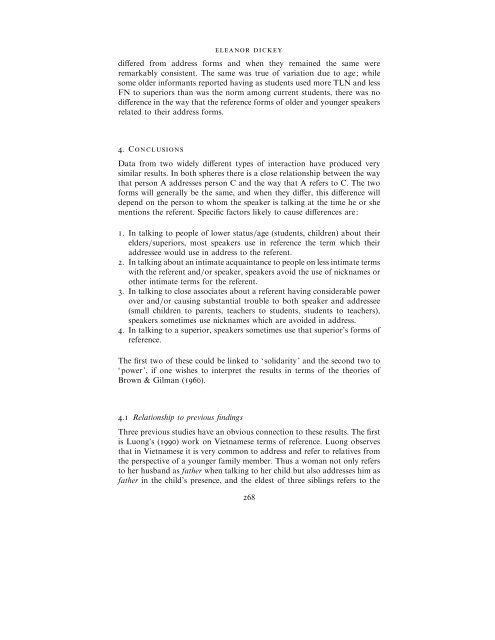Forms of address and terms of reference - Exeter Research and ...
Forms of address and terms of reference - Exeter Research and ...
Forms of address and terms of reference - Exeter Research and ...
You also want an ePaper? Increase the reach of your titles
YUMPU automatically turns print PDFs into web optimized ePapers that Google loves.
eleanor dickey<br />
differed from <strong>address</strong> forms <strong>and</strong> when they remained the same were<br />
remarkably consistent. The same was true <strong>of</strong> variation due to age; while<br />
some older informants reported having as students used more TLN <strong>and</strong> less<br />
FN to superiors than was the norm among current students, there was no<br />
difference in the way that the <strong>reference</strong> forms <strong>of</strong> older <strong>and</strong> younger speakers<br />
related to their <strong>address</strong> forms.<br />
4. Conclusions<br />
Data from two widely different types <strong>of</strong> interaction have produced very<br />
similar results. In both spheres there is a close relationship between the way<br />
that person A <strong>address</strong>es person C <strong>and</strong> the way that A refers to C. The two<br />
forms will generally be the same, <strong>and</strong> when they differ, this difference will<br />
depend on the person to whom the speaker is talking at the time he or she<br />
mentions the referent. Specific factors likely to cause differences are:<br />
1. In talking to people <strong>of</strong> lower statusage (students, children) about their<br />
elderssuperiors, most speakers use in <strong>reference</strong> the term which their<br />
<strong>address</strong>ee would use in <strong>address</strong> to the referent.<br />
2. In talking about an intimate acquaintance to people on less intimate <strong>terms</strong><br />
with the referent <strong>and</strong>or speaker, speakers avoid the use <strong>of</strong> nicknames or<br />
other intimate <strong>terms</strong> for the referent.<br />
3. In talking to close associates about a referent having considerable power<br />
over <strong>and</strong>or causing substantial trouble to both speaker <strong>and</strong> <strong>address</strong>ee<br />
(small children to parents, teachers to students, students to teachers),<br />
speakers sometimes use nicknames which are avoided in <strong>address</strong>.<br />
4. In talking to a superior, speakers sometimes use that superior’s forms <strong>of</strong><br />
<strong>reference</strong>.<br />
The first two <strong>of</strong> these could be linked to ‘solidarity’ <strong>and</strong> the second two to<br />
‘power’, if one wishes to interpret the results in <strong>terms</strong> <strong>of</strong> the theories <strong>of</strong><br />
Brown & Gilman (1960).<br />
4.1 Relationship to previous findings<br />
Three previous studies have an obvious connection to these results. The first<br />
is Luong’s (1990) work on Vietnamese <strong>terms</strong> <strong>of</strong> <strong>reference</strong>. Luong observes<br />
that in Vietnamese it is very common to <strong>address</strong> <strong>and</strong> refer to relatives from<br />
the perspective <strong>of</strong> a younger family member. Thus a woman not only refers<br />
to her husb<strong>and</strong> as father when talking to her child but also <strong>address</strong>es him as<br />
father in the child’s presence, <strong>and</strong> the eldest <strong>of</strong> three siblings refers to the<br />
268
















